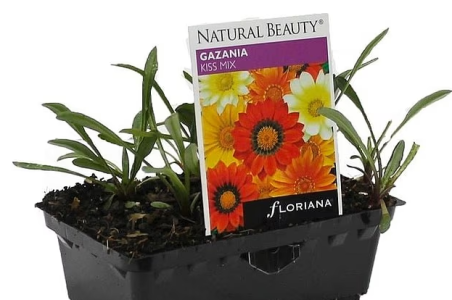It brightened Aussie gardens in the ’50s—now it’s threatening to wipe out farmland
By
Maan
- Replies 3
At first glance, it might seem like just another cheerful addition to the garden centre shelves.
But experts are now sounding the alarm over a popular plant that could be wreaking quiet havoc across the country.
What started as a decorative choice has taken a dangerous turn, with serious implications for both the environment and the economy.
Attractive and easy to grow, the Gazania flower had long been welcomed into Aussie gardens as a vibrant ornamental feature.
But new research uncovered a troubling truth about this popular plant—and scientists warned the damage could already be in the billions.
Originally brought into the country sometime between the 1950s and 1970s, the South African native was once prized for its hardy nature and dazzling blooms. However, its resilience has now become its biggest threat.
The flower has taken root well beyond garden beds, spreading into native grasslands, coastlines, and even cropping fields—especially in low-rainfall areas of South Australia.
Muhammad Adnan, a PhD student with the La Trobe Institute for Sustainable Agriculture and Food (LISAF), led a major study on the plant’s adaptability. Thousands of Gazania seeds were gathered from across the country to test how they fared in different environmental conditions. The results were sobering.
‘It suggests they could become a problematic weed year-round in many parts of Australia, potentially leading to high infestation levels,’ Adnan said.
Researchers from LaTrobe University echoed that concern, adding: ‘There are major concerns that Gazania is killing productive land with crops unable to compete against such a vigorous weed.’
Despite mounting evidence, Gazania seeds and plants remained available for purchase through major retailers, including Bunnings, Amazon, and online garden stores. They continued to be sold even in areas where their threat had been officially recognised.
‘Gazanias are not only overrunning native grasslands, coastlines and roadsides, they are moving into grain production areas, choking out crops and costing farmers,’ said Invasive Species Council Advocacy Manager Imogen Ebsworth.
The weed’s spread wasn’t limited to rural land either. It was seen along stream banks, sand dunes, roadsides and wastelands in both Western and Southern Australia.
Its ability to thrive under stress—including salinity, extreme temperatures, light deprivation, moisture changes and varied burial depths—meant that it was proving resistant to standard herbicide treatments.
In some grain-producing regions, farmers were already losing the battle.
The Invasive Species Council called for a nationwide ban on its sale. Victoria officially listed Gazania as a highly invasive species, while South Australia banned it entirely in March 2021.
Still, retailers defended their offerings. In a statement, a Bunnings spokesperson said: ‘Like many nurseries and retailers, we sell a wide range of locally-sourced plants across our stores and we work hard to create an assortment that caters to customer preferences and demand.
‘As always, we closely follow all relevant local biosecurity regulations and the advice of regulators about the plants we sell.’
But with projected costs to the agricultural sector reaching as high as $5 billion annually, experts warned that allowing the continued spread of this deceptively pretty flower could have lasting consequences.
The question now was whether authorities would act quickly enough—or if the damage had already been done.

With so many of us having tended to gardens over the years, have you ever unknowingly planted something that turned out to be a pest? Let us know your thoughts in the comments.
In a previous story, we looked at another hidden threat lurking in Aussie backyards—one that could be putting families and pets at risk without them even realising.
For seniors who’ve spent years nurturing their gardens, knowing which plants are safe—and which ones are silently causing harm—is more important than ever.
If you’re worried about what might be growing just beyond the flowerbed, that one’s worth a read too.
Read more: Attention Aussies: You Could be Growing a Toxic Killer in Your Backyard!
But experts are now sounding the alarm over a popular plant that could be wreaking quiet havoc across the country.
What started as a decorative choice has taken a dangerous turn, with serious implications for both the environment and the economy.
Attractive and easy to grow, the Gazania flower had long been welcomed into Aussie gardens as a vibrant ornamental feature.
But new research uncovered a troubling truth about this popular plant—and scientists warned the damage could already be in the billions.
Originally brought into the country sometime between the 1950s and 1970s, the South African native was once prized for its hardy nature and dazzling blooms. However, its resilience has now become its biggest threat.
The flower has taken root well beyond garden beds, spreading into native grasslands, coastlines, and even cropping fields—especially in low-rainfall areas of South Australia.
Muhammad Adnan, a PhD student with the La Trobe Institute for Sustainable Agriculture and Food (LISAF), led a major study on the plant’s adaptability. Thousands of Gazania seeds were gathered from across the country to test how they fared in different environmental conditions. The results were sobering.
‘It suggests they could become a problematic weed year-round in many parts of Australia, potentially leading to high infestation levels,’ Adnan said.
Researchers from LaTrobe University echoed that concern, adding: ‘There are major concerns that Gazania is killing productive land with crops unable to compete against such a vigorous weed.’
Despite mounting evidence, Gazania seeds and plants remained available for purchase through major retailers, including Bunnings, Amazon, and online garden stores. They continued to be sold even in areas where their threat had been officially recognised.
‘Gazanias are not only overrunning native grasslands, coastlines and roadsides, they are moving into grain production areas, choking out crops and costing farmers,’ said Invasive Species Council Advocacy Manager Imogen Ebsworth.
The weed’s spread wasn’t limited to rural land either. It was seen along stream banks, sand dunes, roadsides and wastelands in both Western and Southern Australia.
Its ability to thrive under stress—including salinity, extreme temperatures, light deprivation, moisture changes and varied burial depths—meant that it was proving resistant to standard herbicide treatments.
In some grain-producing regions, farmers were already losing the battle.
The Invasive Species Council called for a nationwide ban on its sale. Victoria officially listed Gazania as a highly invasive species, while South Australia banned it entirely in March 2021.
Still, retailers defended their offerings. In a statement, a Bunnings spokesperson said: ‘Like many nurseries and retailers, we sell a wide range of locally-sourced plants across our stores and we work hard to create an assortment that caters to customer preferences and demand.
‘As always, we closely follow all relevant local biosecurity regulations and the advice of regulators about the plants we sell.’
But with projected costs to the agricultural sector reaching as high as $5 billion annually, experts warned that allowing the continued spread of this deceptively pretty flower could have lasting consequences.
The question now was whether authorities would act quickly enough—or if the damage had already been done.
Key Takeaways
- Scientists warned that Gazania, a colourful ornamental flower, has become an invasive weed in Australia.
- The plant has spread rapidly across grasslands, coastlines, and farmlands, particularly affecting crops in South Australia.
- Research showed Gazania can survive extreme conditions and resist standard herbicides, raising fears of year-round infestations.
- Despite official concerns and bans in some states, Gazania remains available for sale through major retailers.
With so many of us having tended to gardens over the years, have you ever unknowingly planted something that turned out to be a pest? Let us know your thoughts in the comments.
In a previous story, we looked at another hidden threat lurking in Aussie backyards—one that could be putting families and pets at risk without them even realising.
For seniors who’ve spent years nurturing their gardens, knowing which plants are safe—and which ones are silently causing harm—is more important than ever.
If you’re worried about what might be growing just beyond the flowerbed, that one’s worth a read too.
Read more: Attention Aussies: You Could be Growing a Toxic Killer in Your Backyard!








